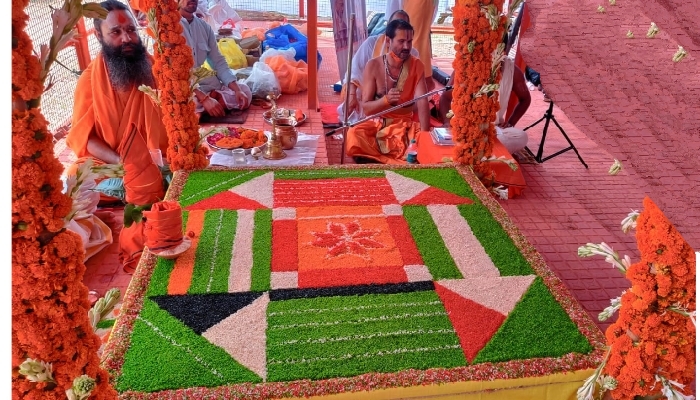Poet and philosopher Mirza Ghalib, who contributed greatly towards Urdu and Persian literature, was paid tributes by the Google with its doodle on his 220th birth anniversary on December 27, 2017. The Google Doodle fittingly shows Ghalib with his pen and paper, knitting his imagination, with a backdrop of buildings of Mughal architecture.
In its blog post, Google said, “His (Ghalib) verse is characterised by a lingering sadness borne of a tumultuous and often tragic life — from being orphaned at an early age, to losing all of his seven children in their infancy, to the political upheaval that surrounded the fall of Mughal rule in India. He struggled financially, never holding a regular paying job but instead depending on patronage from royalty and more affluent friends.”
“But despite these hardships, Ghalib navigated his circumstances with wit, intellect, and an all-encompassing love for life. His contributions to Urdu poetry and prose were not fully appreciated in his lifetime, but his legacy has come to be widely celebrated, most particularly for his mastery of the Urdu ghazal (amatory poem),” the post added.
Born on December 27, 1797 in Agra, when Mughal Empire was counting its last days, Mirza Ghalib began his literary works at the age of 11. Although his first language was Urdu, Turkish and Persian were spoken at home too. After getting married by the age of 13, he settled in Delhi.
In one of his letters, Ghalib describes his marriage as the second imprisonment after the initial confinement that was life itself. The idea that life is one continuous painful struggle which can end only when life itself ends, is a recurring theme in his poetry.
His poem and Ghazals have been translated and recited in multiple languages across the globe. In 1850, he was honoured with the title of Dabir-ul-Mulk by Mughal emperor Bahadur Shah Zafar II. During the last years of the Mughal Empire, Mirza Ghalib was not only an important member of the Mughal court, but also the poet tutor to the emperor's eldest son, Prince Fakhr-ud Din Mirza. The emperor also appointed him as the royal historian of the Mughal court.
Following the decline of the Mughal Empire, Mirza Ghalib struggled to make a living. Much of his fame came to him posthumously and in his lifetime, despite his best attempts, he couldn't get the British to restore his full pension.
Mirza Ghalib died in Delhi on 15 February 1869 and the house where he lived, in Old Delhi, has been turned into "Ghalib Memorial". Known as "Ghalib ki Haveli", it permanently houses Ghalib's exhibitions.
Imprints on heart and mind
One of the recurring themes in Mirza Ghalib's poems is the idea that life is a continuous painful struggle which ends only with life itself. His poems perfectly capture the pathos of love and continue to be relevant even after all these years. Here are some of the famous sher by the legendary poet that manage to pierce the heart:
aah ko chaahiye ik umr asar hone tak
kaun jeeta hai teri zulf ke sar hone tak
(Translation: A lifetime passes before a sigh shows its effect, who would wait so long to see you fixing the tangles in your hair)
un ke dekhe se jo aa jaati hai munh par raunaq
vo samajhte hain ki beemar ka haal achha hai
(Translation: My face lights up when I see her and she feels that the sick me is now okay)
hazaron khwahishen aisi ki har khwahish pe dam nikle,
bahut nikle mire armaan lekin phir bhi kam nikle
(Translation: I have a thousand desires, all desires worth dying for,
Though many of my desires were fulfilled, many remained unfulfilled)
hum ko maalum hai jannat ki haqiqat lekin
dil ke khush rakhne ko 'ghalib' ye khayal achha hai
(Translation: We know what's the truth, but to please yourself, this thought is good)
hum toh fanaah ho gaye uskii aankhen dekh kar, Ghalib,
na jaanein woh aaina kaise dekhte hongey
(Translation: I just lost my mind after seeing her eyes, Ghalib,
I wonder how she sees herself in the mirror)
ye na thi hamari qismat ki visal-e-yaar hota
agar aur jeete rahte yahi intezar hota
(Translation: That my love be consummated, fate did not ordain
Living longer had I waited, would have been in vain)
Kaid-e-hayat O band-e-gham asalm men donon ek hain
Mauth se pahle aadmi gham se najat paye kyon?
(Translation: The prison of life and the bondage of grief are one and the same/ Before the onset of death, why should man expect to be free of grief?)






Comments
Good article. Translation of poem is poor.
Super article, a fiiting tribute to this great poet
Add new comment